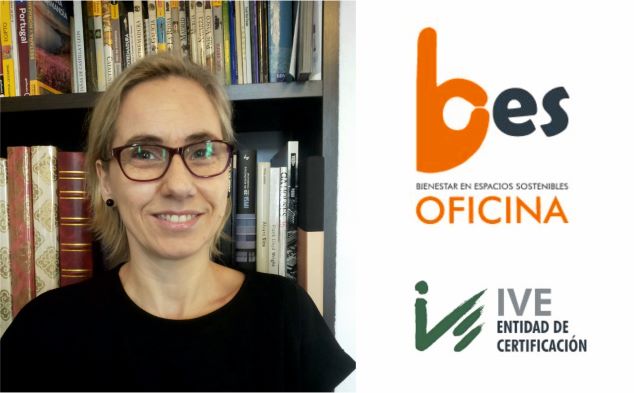Since 2017 the IVE Certification Entity offers “BES Office”, which is a certification scheme for buildings and office premises in use, in which a company or organization is normally developing its professional activity. The “BES Office” is a quality certificate that is granted, through a thorough and independent certification process, to those workspaces that are fully operational and have environmental and spatial conditions of great influence for the well-being of employees.
Since the beginning of the ALDREN project, the IVE certification entity has been consulted on numerous occasions given its extensive experience in the field of certification. At the moment, work is being done on the partial incorporation of the ALDREN methodology in the existing “BES Office” certification.
Isabel de los Ríos, responsible for the Secretariat of the IVE Certification Entity, highlights in this interview the strengths of the ALDREN methodology.
- What are the main market barriers facing building certification schemes?
The Voluntary Certification Schemes offer added value to the evaluated building, both for the real and effective improvement that any quality control process brings to the controlled product, and for the trust that third-party certification schemes offer regarding the quality of space or construction.
If the market does not clearly recognize that a certain voluntary certification scheme guarantees this added value, it will be difficult to make an economic investment and a technical effort to implement it.
In general, I consider that the social agents involved in the building sector perceive favourably that voluntary certification schemes promote the real quality of the building and the use of certain materials, facilities or systems that significantly improve the energy performance of the building. Submitting a building to an evaluation process requires rigorous precision that, on the one hand, makes it easier for the project to contain all the information necessary to adequately define a building and, on the other, for the work carried out to be faithful to the content of the project on paper.
Public recognition is the most complex aspect to achieve since it requires the maturity of the voluntary certification scheme and the existence of evident advantages for the promoter, both commercial, financial, fiscal, etc. which are complex to implement.
- Given that Energy Performance Certificates (EPC) are mandatory, what benefits can it offer that buildings also have a voluntary environmental certification? What do you think about the coexistence between the mandatory energy certificate and the voluntary environmental certification schemes of buildings?
Voluntary environmental certification schemes can and should coexist with mandatory energy schemes, as long as they value aspects that are different and innovative in energy matters, or environmental aspects that are complementary to purely energy aspects.
We are talking, for example, of incorporating requirements on water consumption, the use of sustainable materials, the establishment of limit values in parameters of environmental comfort such as air quality, noise, spatial configuration, etc., all of them aiming, not only at protecting the environment but to improve the well-being of the occupants or users.
- ALDREN’s backbone is a harmonized European voluntary certification scheme that integrates the assessment of energy, health, and wellbeing performances of the building. What are the main strengths of the ALDREN methodology in your opinion?
ALDREN offers a detailed and rigorous methodology to evaluate both the current state of the building under study and the improved state according to the planned energy renovation.
In addition, it is a methodology that aims to improve the evaluation of the energy performance of buildings and bringing computer models closer to the built reality. This aspect is key and represents one of its greatest strengths, which, logically, is well received by professionals who are dedicated to improving the quality of buildings in general and promoting efficient renovation.
- Which ALDREN modules/indicators/protocols do you plan to integrate into “BES Offices”?
Thanks to ADREN we are updating environmental parameters such as some relating to air quality, but fundamentally the Energy Saving requirement is being updated, expanding the range of features that can be chosen to achieve BES certification.
The BES Offices Design Guide will expand the aspects related to how energy audits and monitoring should be and will incorporate a feature aimed at promoting the drafting of roadmaps for the continuous improvement of the building in terms of its energy performance.
This interview is part of the “REHVA Journal” 03/2020 (August 2020). More information HERE


Recent Comments